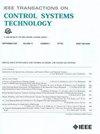Fast Zone Model Predictive Control for High Capacity Battery Subpack of Electric Vehicle
IF 3.9
2区 计算机科学
Q1 AUTOMATION & CONTROL SYSTEMS
引用次数: 0
Abstract
As the demand for electric vehicles (EVs) increases, battery thermal management is required to guarantee safety and improve driving performance. The batteries need to be operated within an appropriate temperature range while minimizing energy consumption. We propose a fast zone model predictive control (MPC), which determines the optimal flow rate and inlet temperature of the coolant to control the temperatures of 48 cells in subpack. When the battery temperatures are within the proper temperature range, the proposed zone MPC focuses on minimizing power consumption while maintaining the temperature within the zone. When the temperature is outside the zone, the set-point MPC with terminal cost is used to determine the optimal input sequence. To achieve computational efficiency, a control-oriented battery thermal model is first established considering the temperature distribution of all cells. Second, the zone MPC formulation is converted into quadratic programming (QP). The nondifferentiable objective function of zone nonlinear MPC (NMPC) is approximated with a soft-plus function, and then, new variables are introduced to convert the nonlinear objective function into the quadratic form. Finally, the nonlinear dynamics are handled with the successive linearization method, which leads to QP formulation. By applying the proposed MPC, total energy consumption for cooling and heating cases under 1C-rate discharge was reduced by 27.11% and 78.73%, respectively, compared with the set-point MPC.电动汽车大容量电池子组快速区域模型预测控制
随着电动汽车需求的增加,电池热管理是保证安全性和提高驾驶性能的必要条件。电池需要在适当的温度范围内工作,同时尽量减少能量消耗。提出了一种快速区域模型预测控制(MPC)方法,通过确定冷却剂的最佳流量和入口温度来控制子电池组中48个电池的温度。当电池温度在适当的温度范围内时,建议的区域MPC侧重于最小化功耗,同时保持区域内的温度。当温度在区域外时,采用考虑终端成本的MPC设定点确定最优输入顺序。为了提高计算效率,首先考虑电池的温度分布,建立了面向控制的电池热模型。其次,将区域MPC公式转化为二次规划(QP)。首先用软加函数逼近区域非线性MPC (NMPC)的不可微目标函数,然后引入新的变量将非线性目标函数转化为二次型。最后,用连续线性化方法处理非线性动力学,得到QP公式。采用MPC后,与设定点MPC相比,制冷和制热工况的总能耗分别降低了27.11%和78.73%。
本文章由计算机程序翻译,如有差异,请以英文原文为准。
求助全文
约1分钟内获得全文
求助全文
来源期刊

IEEE Transactions on Control Systems Technology
工程技术-工程:电子与电气
CiteScore
10.70
自引率
2.10%
发文量
218
审稿时长
6.7 months
期刊介绍:
The IEEE Transactions on Control Systems Technology publishes high quality technical papers on technological advances in control engineering. The word technology is from the Greek technologia. The modern meaning is a scientific method to achieve a practical purpose. Control Systems Technology includes all aspects of control engineering needed to implement practical control systems, from analysis and design, through simulation and hardware. A primary purpose of the IEEE Transactions on Control Systems Technology is to have an archival publication which will bridge the gap between theory and practice. Papers are published in the IEEE Transactions on Control System Technology which disclose significant new knowledge, exploratory developments, or practical applications in all aspects of technology needed to implement control systems, from analysis and design through simulation, and hardware.
 求助内容:
求助内容: 应助结果提醒方式:
应助结果提醒方式:


